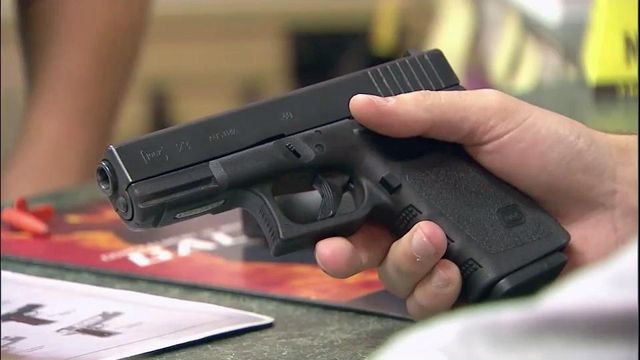Gun bill consideration postponed as doctors worry about communications provisions
House lawmakers postponed consideration of a sweeping firearms bill Wednesday amid concerns by psychiatrists, pediatricians and other doctors that it would interfere with patient treatment.
Posted — UpdatedThe bill had been moving rapidly through the state House in advance of the crossover deadline, the point by which most bills that don't contain taxes, fees or spending items must pass one chamber or the other to remain eligible to pass this year. Late Wednesday, the House Rules Committee added a $20,000 appropriation to the bill, keeping it alive past the crossover point but delaying what would almost surely have been a contentious debate.
One of the most controversial measures in the bill prohibited doctors from surveying their patients in writing about whether they have firearms in their homes. Such questions are often part of standard questionnaires in pediatricians' offices. While the bill allowed for oral conversations about guns, restrictions on how doctors handle that information had many medical providers worried.
"Legislating what goes on between a doctor and her patients, or a doctor and that patient's parents, is not right," said Dr. Debbie Ainsworth, a pediatrician from Little Washington and board member with the North Carolina Pediatric Society.
House Bill 562 was largely authored by Rep. Jacqueline Schaffer, R-Mecklenburg, although it stitched together several different firearms bills. Asked why she included the language regarding doctors, Schaffer said it originated in a bill filed by another member. However, she said she had heard concerns from constituents.
"They felt that question was violating their privacy rights," she said.
But doctors, such as Ainsworth, interviewed Wednesday say any restrictions lawmakers impose on how doctors talk to their patients about firearms is problematic.
Ainsworth said that, in her rural North Carolina community, guns are a fact of life. Her job, she said, is to remind parents that growing, curious children can move faster and get into trouble more quickly than they realize. As children age, she said, teenagers sometimes experience moodiness or other conditions that merit special attention.
"I approach that very differently if I know there is a gun in the home," Ainsworth said.
A gun can turn an act of impulse by a distraught teen into a deadly incident, one that parents can prevent, she said, pointing to state numbers showing gun deaths are the second-leading cause of mortality among older teens.
Current versions of the bill, doctors say, could prevent them from recording and documenting answers to questions about firearms in the home.
Schaffer said that wasn't the case. Rather, the bill would restrict how the doctor transmits that information, particularly to government agencies such as police departments. But doctors said there was a difference in how the law would work in theory and in practice.
That could be problematic for both addressing patient needs as well as handling lawsuits and inquiries about bad outcomes later on.
"If any kind of health care provider doesn't document something, it hasn't happened," said Robin Huffman, director of the North Carolina Psychiatric Society.
A state law banning what is nationally considered to be the standard of care in medicine, Huffman said, doesn't excuse doctors from living up to those standards.
"There is a great medical malpractice concern," she said.
Beyond medical malpractice, Laura Willing, a psychiatric fellow specializing in adolescents and children at the University of North Carolina at Chapel Hill, said that questions about firearms are crucial for some patients.
"When I have a relationship with a patient, I want to take good care of them," Willing said. "It's a safety issue for people with mental illness."
Willing and Ainsworth both pointed out that doctors ask about a host of things regarding a child's home environment, including whether there is a swimming pool, whether they wear a helmet while biking, whether car seats are used and other things that factor into accident safety.
A spokeswoman for the North Carolina Medical Society said the bill would "deprive physicians of the information they need to assess those health risks."
It is unclear when the House will take up the measure, which is now sitting in the House Appropriations Committee.
Others have reservations as well
The bill also would allow prosecutors to carry guns in the courtroom, but Wake County District Attorney Lorrin Freeman said she prefers to rely on sheriff's deputies for protection.
“This is not something we have asked for or would ask for,” Freeman said of the armed prosecutors provision. “I think that, anytime you bring more guns into the courthouse by people who are not sworn law enforcement, that you're asking for problems.”
Under the bill, people with concealed carry permits could lock guns in their cars on public school property. Clay Ausley, the owner of Fuquay Gun in Fuquay-Varina, supports the change.
“If you had the right people with firearms on school grounds, it can actually serve as a pretty good deterrent,” Ausley said. “Your law-abiding concealed carry holders are going to abide by the laws and do things the way they are supposed to and are not going to be a menace to society.”
Related Topics
• Credits
Copyright 2024 by Capitol Broadcasting Company. All rights reserved. This material may not be published, broadcast, rewritten or redistributed.






